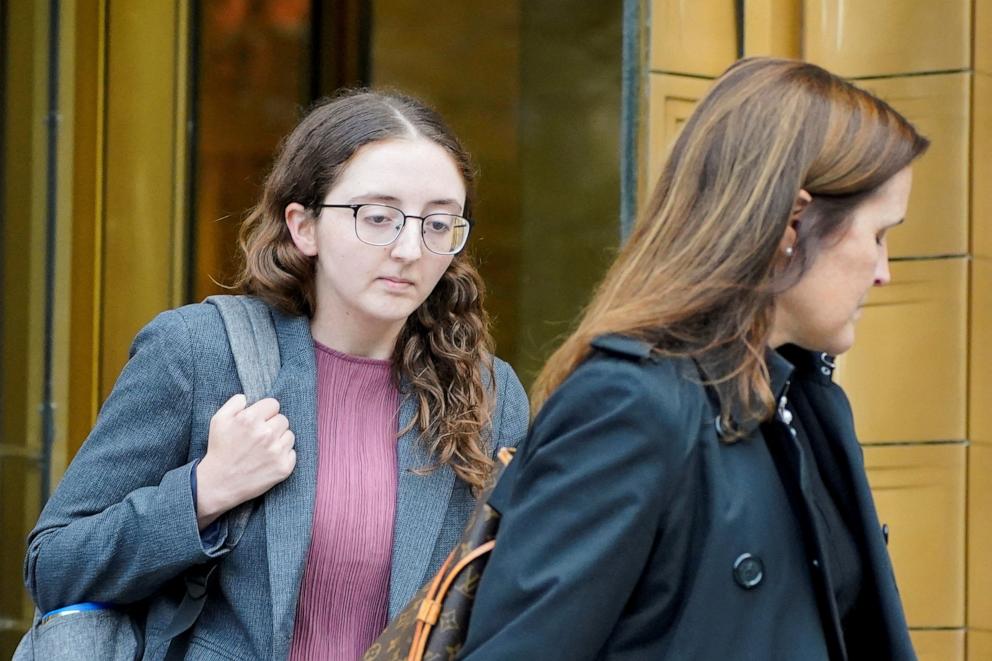Former FTX executive Caroline Ellison said she deserves no prison time for her role in one of the largest financial frauds in history and federal prosecutors seem inclined to agree.
Ellison’s attorneys urged Judge Lewis Kaplan to be lenient when he sentences her Tuesday afternoon, arguing Ellison “unflinchingly acknowledged her own wrongdoing, without minimization, blame shifting or self-pity.” They added, “She time and again proved herself an enormously credible and important cooperating witness” against her on again-off again boyfriend, former FTX CEO Sam Bankman-Fried.
Ellison testified for three days at Bankman-Fried’s trial that ended with a conviction on all seven counts: wire fraud and conspiracy to commit wire fraud on FTX’s customers; wire fraud and conspiracy to commit wire fraud on Alameda Research’s lenders; conspiracy to commit securities fraud on FTX’s investors; conspiracy to commit commodities fraud on FTX’s customers; and conspiracy to commit money laundering.
Federal prosecutors agreed Ellison provided “extraordinary cooperation that was crucial to the Government’s successful prosecution” of Bankman-Fried.
“Although she did not blow the whistle on any misconduct before FTX’s collapse, she came clean prior to FTX’s declaring bankruptcy to her employees on November 9, 2022,” prosecutor Danielle Sassoon wrote in a letter to the judge. “Ellison approached her cooperation with remarkable candor, remorse, and seriousness.”

Former crypto hedge fund Alameda Research CEO Caroline Ellison at Federal Court in New York City, Oct. 10, 2023.
Cheney Orr/Reuters, FILE
Prosecutors declined to make a specific sentencing recommendation. Defense attorneys suggested a sentence in line with a recommendation from probation officials of time served plus three years supervised release.
“Caroline poses no risk of recidivism and presents no threat to public safety. It would therefore promote respect for the law to grant leniency in recognition of Caroline’s early disclosure of the crimes, her unmitigated acceptance of responsibility for them, and—most importantly—her extensive cooperation with the government,” defense attorney Anjan Sahni wrote in a letter to the judge.
Sahni outlined Ellison’s “complex” relationship with Bankman-Fried that began when the two met at Jane Street Capital in 2015 when she was an intern and he was a junior trader.
“Caroline moved around the globe at his direction, first to Hong Kong and later the Bahamas” while working “long, stressful, Adderall-fueled hours,” Sahni said.
“Caroline was in an on-again-off-again, sometimes-secret relationship with Mr. Bankman-Fried that she understood at the time was fundamentally unequal. Deeply unhappy, Caroline repeatedly considered leaving Alameda, but Mr. Bankman-Fried convinced her to stay, telling her she was essential to the survival of the business, and that he loved her (while also perversely demonstrating that he considered her not good enough to be seen in public with him at high-profile events),” the defense letter said.
Her attorney said it all “warped” her moral compass and led her to take actions “that she knew to be wrong, helping him steal billions.”
Bankman-friend was sentenced to 25 years in prison in March. He has filed an appeal to overturn his conviction.
Caroline Ellison, a former executive at cryptocurrency exchange FTX, has recently been advocating for leniency in sentencing for a high-profile crypto fraud case. The case involves a group of individuals who were accused of defrauding investors out of millions of dollars through a fraudulent cryptocurrency scheme.
Ellison, who has been following the case closely, believes that the defendants should be given a second chance and that harsh punishments may not be the most effective way to address the issue of crypto fraud. She argues that many individuals involved in the cryptocurrency industry are young and inexperienced, and may not fully understand the legal implications of their actions.
In a recent interview, Ellison stated, “I believe that the defendants in this case made a mistake, but I don’t think they should be punished for it for the rest of their lives. We need to find a balance between holding individuals accountable for their actions and giving them the opportunity to learn from their mistakes and contribute positively to society.”
Ellison’s advocacy for leniency in sentencing has sparked a debate within the cryptocurrency community. Some argue that harsh punishments are necessary to deter others from engaging in fraudulent activities, while others believe that rehabilitation and education are more effective ways to prevent future crimes.
As a former executive in the cryptocurrency industry, Ellison brings a unique perspective to the discussion. She understands the complexities of the industry and the challenges that individuals face when navigating the legal landscape. Her advocacy for leniency in sentencing reflects a growing awareness of the need for more nuanced approaches to addressing crypto fraud cases.
Ultimately, the decision on sentencing will be up to the courts. However, Ellison’s advocacy serves as a reminder that there are often multiple factors to consider when determining appropriate punishments for individuals involved in crypto fraud cases. By promoting a more compassionate and understanding approach, she hopes to encourage positive change within the industry and prevent future incidents of fraud.


